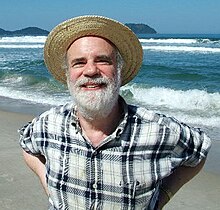Saul Aaron Kripke (/ˈkrɪpki/; November 13, 1940 – September 15, 2022) was an American analytic philosopher and logician. He was Distinguished Professor of Philosophy at the Graduate Center of the City University of New York and emeritus professor at Princeton University. From the 1960s until his death, he was a central figure in a number of fields related to mathematical and modal logic, philosophy of language and mathematics, metaphysics, epistemology, and recursion theory.
Kripke made influential and original contributions to logic, especially modal logic. His principal contribution is a semantics for modal logic involving possible worlds, now called Kripke semantics.[6] He received the 2001 Schock Prize in Logic and Philosophy.
Kripke was also partly responsible for the revival of metaphysics and essentialism after the decline of logical positivism, claiming necessity is a metaphysical notion distinct from the epistemic notion of a priori, and that there are necessary truths that are known a posteriori, such as that water is H2O. A 1970 Princeton lecture series, published in book form in 1980 as Naming and Necessity, is considered one of the most important philosophical works of the 20th century. It introduced the concept of names as rigid designators, designating (picking out, denoting, referring to) the same object in every possible world, as contrasted with descriptions. It also established Kripke's causal theory of reference, disputing the descriptivist theory found in Gottlob Frege's concept of sense and Bertrand Russell's theory of descriptions. Kripke is often seen in opposition to the other great late-20th-century philosopher to eschew logical positivism: W. V. O. Quine. Quine rejected essentialism and modal logic.[7][8]
Kripke also gave an original reading of Ludwig Wittgenstein, known as "Kripkenstein", in his Wittgenstein on Rules and Private Language. The book contains his rule-following argument, a paradox for skepticism about meaning. Much of his work remains unpublished or exists only as tape recordings and privately circulated manuscripts.
- ^ Cumming, Sam (March 19, 2013). "Names". In Zalta, Edward N. (ed.). The Stanford Encyclopedia of Philosophy (Fall 2016 ed.). Metaphysics Research Lab, Stanford University.
- ^ Palmquist, Stephen (December 1987). "A Priori Knowledge in Perspective: (II) Naming, Necessity and the Analytic A Posteriori". The Review of Metaphysics. 41 (2): 255–282.
- ^ Georg Northoff, Minding the Brain: A Guide to Philosophy and Neuroscience, Palgrave, p. 51.
- ^ Michael Giudice, Understanding the Nature of Law: A Case for Constructive Conceptual Explanation, Edward Elgar Publishing, 2015, p. 92.
- ^ Saul Kripke (1986). "Rigid Designation and the Contingent A Priori: The Meter Stick Revisited" (Notre Dame).
- ^ Jerry Fodor, "Water's water everywhere", London Review of Books, 21 October 2004
- ^ Quine versus Kripke on the Metaphysics of Modality
- ^ What the Tortoise said to Kripke by Romina Padro
